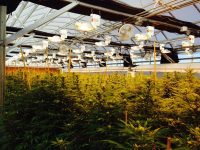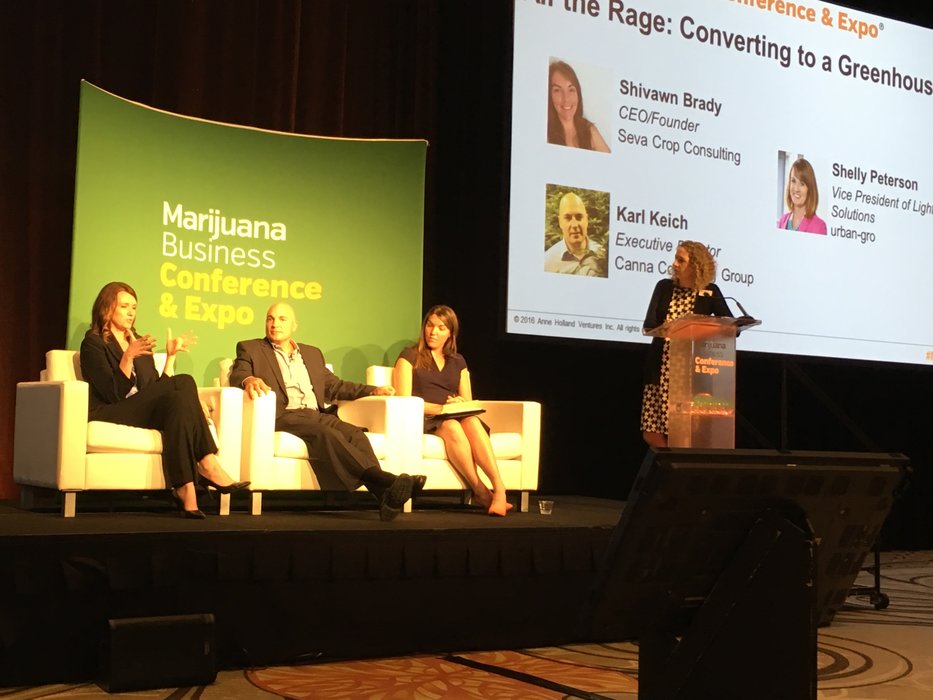Originally published in the Cannabis Industry Journal.
Successful cannabis cultivation practices leverage commercial agricultural industry practices for the most efficient and cost-effective production of the crop. Since the 1990s, the cannabis industry has cultivated primarily in indoor warehouses and outdoor farms, however the industry is experiencing a significant shift toward greenhouses.
Shelly Peterson, vice president of light product solutions at urban-gro, joined a recent panel of industry experts including Shivawn Brady, chief executive officer and founder of Seva Crop Consulting, and Karl Keich, executive director at Canna Consulting Group, at the Marijuana Business Conference in Orlando, Florida, to discuss how to transition from an indoor or outdoor grow to a greenhouse facility.
What are the considerations when deciding between a warehouse and greenhouse? The panel shares four factors around the costs and operational challenges, and the benefits of a greenhouse.

Maximize Efficiency in Every Process
Why are cannabis cultivators looking toward greenhouses? Peterson says it is all about efficiency. “In a warehouse, electricity costs can run up to 50 percent of the total cost of goods sold, which is a tremendous amount that can be decreased by switching to a greenhouse,” says Peterson. “In a greenhouse, you can add supplemental lighting to augment what the plant is receiving from the sun.”
For cultivators, Peterson noted that it is critical to ensure growers have experienced vendors and advisors on the team to help maximize the efficiency of the greenhouse. “As the cost of this product comes down, the efficient growers will be the ones in it for the long haul,” added Peterson.
Construction vs. Operating Costs

The panel identified upfront cost as one of the biggest challenges faced when building out a greenhouse. “The cost of retrofitting a warehouse and building a greenhouse are similar, but where you will save is in the operational costs,” says Peterson. “Lighting can be up to one third of your total cost in indoor facilities, when you switch to a greenhouse that cost can be reduced by 50 to 70 percent.”
Brady acknowledged that some traditional greenhouses have challenges in controlling the environment, but automated greenhouses offer retractable roofs and siding. “If you have the resources to invest in your greenhouse system upfront, that is generally a better way to save money in the long run,” says Brady. “Managing pests in greenhouses can also become very challenging if you don’t have the proper climate regulations.”
Lighting for Your Greenhouse
One of the greatest benefits of growing in a greenhouse is the ability to source natural light. But what about the required light levels? Peterson pointed out that light levels change throughout the year and the plants have different light needs in different stage. Supplement with a lighting system that can read the natural light levels received over any given period of time and be adjusted accordingly. “Greenhouse facilities also need to be outfitted to meet the needs of the cannabis plant, which differ in some ways from other agricultural crops,” says Peterson.
Peterson explained that every light is designed with a different purpose in mind. “There are different lights for indoor warehouse facilities where the lighting system provides 100 percent of the available light for cannabis growth versus supplemental lighting for greenhouses,” Peterson adds. “The key is to measure how much light is actually delivered by the sun on a daily basis, which changes throughout the year; at urban-gro, we supplement the facility with light fixtures that will not create shadowing during hours of sunlight and adjust to reach the optimal collective light levels.”
With LED lighting a hot button topic, Peterson explained that the most important consideration for any light fixture, whether LED or HPS, is it’s efficiency capacity. “It all depends on the budget and payback period and a lot of numbers need to be crunched,” says Peterson. “Yield is directly correlated to light; planning properly, sealing your environment, making sure you have the right target DLI, and buying good light meters, are all key.”
Make a Positive Impact and Quality Product
Brady noted that industry leaders are conscious of positive impact towards human health and environmental stewardship when moving to a greenhouse. Cultivators may find the process challenging initially, however the facilities are quite easy to operate and manage, and allow stress-free cultivation of commercial-scale crops.
Keich added that the cannabis industry is becoming more like commercial agriculture. By utilizing the correct technologies and regulators, greenhouse cultivation makes the crop smell, taste and look that much better. “Let’s use natural sunlight to minimize costs and be environmentally friendly to produce a superior product,” says Keich.
Peterson wrapped up by stressing that cultivators should evaluate the greenhouse environment and lighting to improve their bottom line. “Look at the most efficient way to lower your cost of goods sold. Lighting is a very big component to that,” she continued. “Make sure you evaluate the efficiency of the fixture and ask the questions: Why are we targeting this light level? Is the color spectrum correct? Are you measuring in micromoles per watt? These are all different questions, however figure out how much light is coming out of the fixture and verify it for yourself, and you will be successful,” says Peterson.








